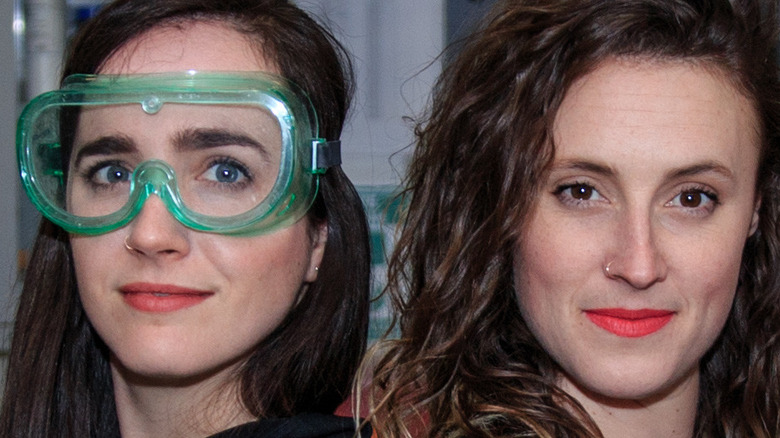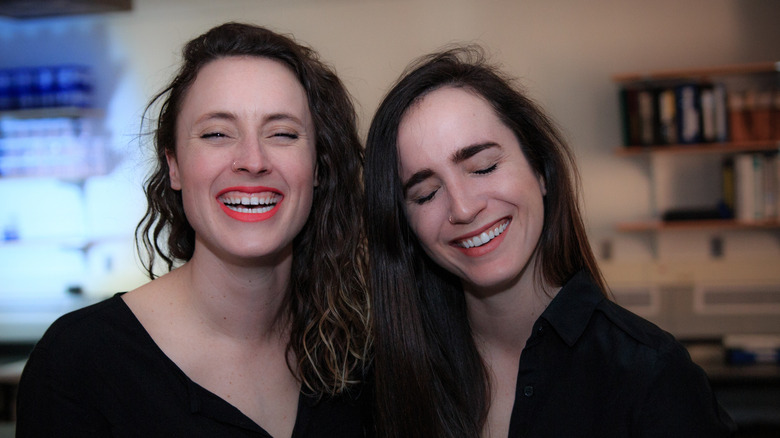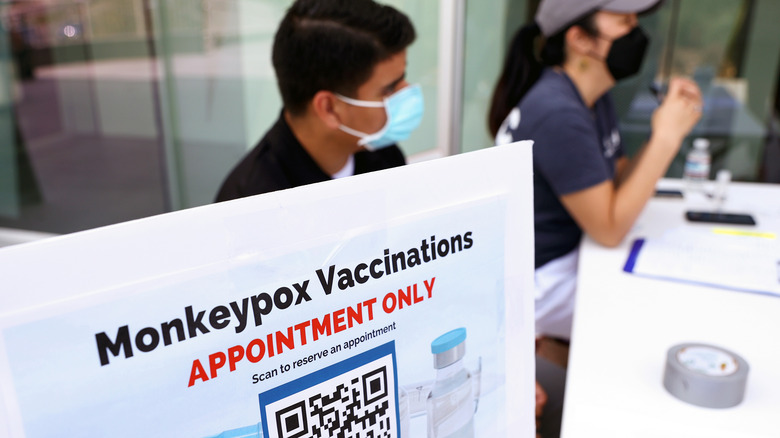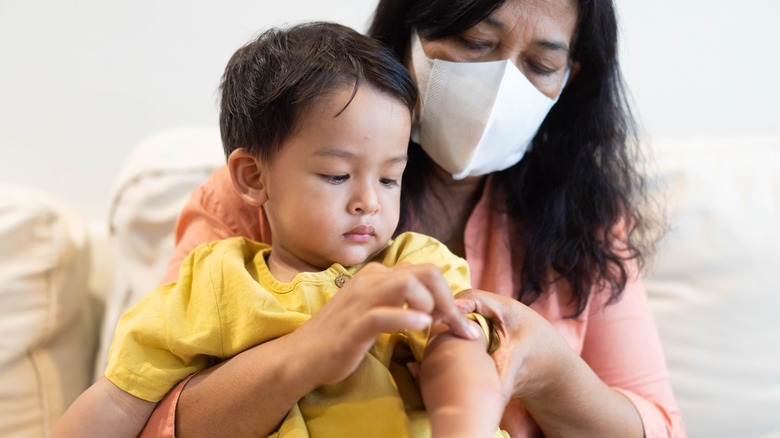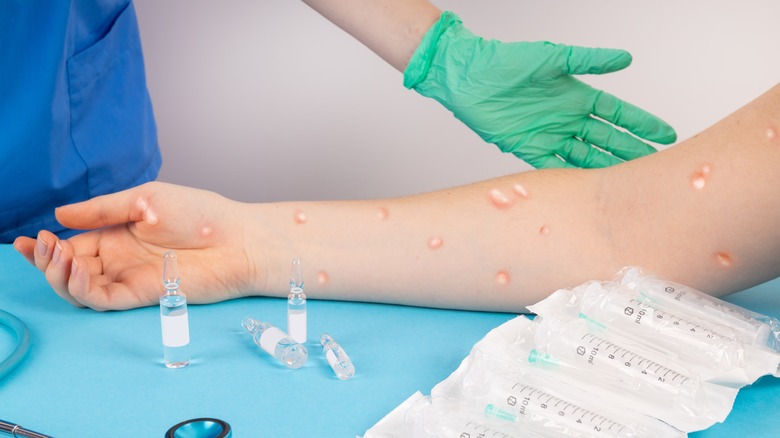This Podcast Will Kill You's Erin Welsh & Erin Updyke On Monkeypox, Covid, And Accessible Science - Exclusive Interview
Erin Welsh and Erin Updyke met where most Ph.D. students studying science do — in a lab. At the time, they were both studying epidemiology, the science of diseases. As they bonded over the grueling work of getting a Ph.D., the Erins started talking about how so much of the information they were learning probably wasn't making it to the public in a way they could understand. One of them — even they can't remember which — said, "We should start a podcast!"
It started as a joke between the Erins, but the more they discussed it, the more they realized that a podcast that made epidemiology accessible to everyone could be really valuable. So, the Erins got to work.
Not long after, the first episode of "This Podcast Will Kill You" aired. This was in 2017. They had no idea that just three years later, the word "epidemiologist" would come up in everyday conversation, or that they'd be doing a podcast about infectious diseases during a pandemic.
"This Podcast Will Kill You" is still going strong, bringing essential information, jokes, and disease-themed cocktail recipes to the world. After their last episode on the Monkeypox outbreak, the Erins sat down with Health Digest to talk what we do and don't know about monkeypox, how they're bridging the gap between science and the public, and what they want everyone to know about the viruses all around us.
Finding each other in the lab
Can you each tell us a little bit about your professional backgrounds and why you chose to study epidemiology?
Erin Welsh: Erin and I have very similar backgrounds, in some ways. My background is in biology. That's what I went to undergrad for. As I was taking these courses, I found myself drawn to microbiology, and studying bacteria, and learning how these different pathogens have impacted humans over time. I joined a lab studying plague, and I really loved it. It was a great experience, but I was studying individual proteins. What does this protein do and that protein? I felt what I really wanted was a bigger picture view.
That's where epidemiology came in and had that other piece of the puzzle where I could take a step back to see patterns of disease in populations. I went on to get a Masters in epidemiology.
There's a pattern here with me and how I came across the things that I enjoy doing. At the end of that, I became interested in understanding how the environment also plays a role in shaping disease. That is where I shifted from my master's in epidemiology. When I completed that, I went on to do a Ph.D. in what ended up being ecology evolution and conservation biology. I studied disease ecology during my Ph.D., [which deals with] the patterns of the potential impact of climate change on tick-borne diseases in Panama.
What about you, Erin [Updyke]?
Erin Updyke: We do have a very same-same but different trajectory. I studied marine biology in undergrad and thought that I wanted to be a shark biologist until I took a class on parasitology. It was a very interesting course because it wasn't a typical parasitology from a human disease perspective. It was an ecological parasitology class. It got me very hooked on the complexity of vector-borne and other ecologically rooted infectious diseases in parasites. After that, I had a little mini crisis, as one does in college.
I ended up going on to do my master's in epidemiology, where I studied more water-borne disease and looking at water quality markers, which was a nice transition between aquatic biology and actual disease ecology. From there, for a while, I thought that I wanted to do outbreak investigation and work for CDC doing that kind of epidemiology. I went on to pursue my M.D. Ph.D., which is where Erin and I met. We were in the same Ph.D. lab, and I studied the ecology and epidemiology of Chagas disease, while Erin was doing tick-borne disease. I finished my M.D., so I'm in residency now.
Starting a podcast
How did you two link up to start "This Podcast Will Kill You"?
Welsh: We started out in the same lab, commiserating over all the trials and tribulations of grad school and the horror show that a Ph.D. program can be but isn't always. We had been friends for a number of years before the idea of a podcast came about, and it came about very spontaneously and randomly.
It was the summer right before the last year of our Ph.D.s began, and we had spent that summer going to academic conferences, presenting some of our Ph.D. work, listening to other people give updates on their research. Those conferences are super fascinating. They're really important to make connections, to see what people are doing and what is the cutting edge in disease ecology.
But there's the flip side of it that we both felt like, "Where is this information going after this? How is it going to reach more people? How is this going to take the step from academia to application, or wider knowledge?"
There's also the aspect of language. In a lot of scientific writing, you have to remove yourself from it a bit, and you're talking about the results in a very detached way. You're using very specific language, and that language is very important in getting across uncertainty, because in science, nothing is certain. It also makes it more impersonal. We were at a picnic being very antisocial, talking with each other, and –
Updyke: That's our typical.
Welsh: That was very typical. We were complaining about the summer and complaining about these feelings of [being] tired of that part of academia. "Where is the fun in this?" We loved talking about disease and we always have, but it wasn't as fun as it used to be. One of us said to the other, "We should do a podcast." Then it was like, "Haha. Yeah, right," and then it was, "No, we should do a podcast."
"What would it be about?"
"Well, we could talk about diseases. We love talking about diseases."
"Okay. Who would our audience be?" We want everyone who has the slightest interest to be able to listen, and understand, and get something out of it. From then on, it went to format. The Quarantini was born that day, and that was it.
Bridging the gap between scientists and the public
You just brought this up in speaking about that. What are these disconnects between the scientific community and the general public? How is the podcast helping bridge that gap?
Updyke: There's a number, and part of it is what Erin was explaining about the way that we have to use scientific language in communicating with other scientists or other researchers. Sometimes, that includes a lot of jargon. It can include a lot of depersonalization and very specific minutiae and detail that are incredibly important when you're communicating with a very specific audience.
What we were missing was being able to communicate with a larger public, like with our family, who's not into disease or didn't think they were until we started this podcast. What we are trying to do is make a lot of the science more accessible as well as connect it to the history of these diseases. We've felt for a long time that when you learn subjects in isolation, then they can feel a lot less interesting if you're only learning one part of it.
When you realize how integrated something like a disease is in our history, and our biology, and our sociology, it becomes a lot more interesting and engaging. You can tell a story in a way that you don't always have the opportunity to do in purely scientific writing.
Educating during a global pandemic
What has it been like to do this podcast about disease during a global pandemic?
Welsh: Surreal.
Updyke: It's been a lot.
Welsh: There are still days where I pinch myself and I'm like, "We are in a pandemic." It was very funny. A listener pointed out that in our very first episode, which was on influenza and we recorded that and released it in 2017, we defined the word pandemic. You wouldn't even think to do that nowadays. Everyone knows what a pandemic is.
From the podcast perspective, it's been very interesting to see the way that there has been a lot of heightened interest in epidemiology in general and people knowing what an epidemiologist is and what they do. It's been interesting to see how information has been presented. It's resulted in a lot of good information coming out and a lot of bad information coming out.
Science communication in general has really grown in the pandemic because people realize that there's an incredible need to communicate what is happening with this virus, and what is happening with this disease, and how it's transmitted, how vaccines work. There's been a huge growth in amazing science communicators on TikTok, on Twitter, communicating this information in real time. There's also the growing of, as there always is alongside of that, the disinformation and misinformation.
We did a series on COVID that we were doing continuous updates here and there and taking one topic at a time. It was really interesting to hear from listeners what they most wanted to know. We would constantly ask, "What do you want to know about this? What are the questions that you want us to focus on?" That was a really interesting way to engage with, "Where are the gaps in knowledge? How are people getting information, and what information are they not getting that they want?"
Tracking monkeypox
We're in another one of those moments. Your latest episode just addressed monkeypox. Can you tell us a little bit of what you learned for that episode about how monkeypox spreads?
Updyke: That was a very interesting and, quite honestly, nerve-wracking episode to do. Like Erin said, when the COVID pandemic first wave began, we pretty quickly realized that we're not experts on any of our subject matter, and we don't try to present ourselves as experts. When we did our COVID miniseries and even our first episode addressing coronaviruses in general, we did have a number of other experts come on and share their expertise. We were able to pick their brains and ask a lot more questions.
With monkeypox, we weren't able to do that. We wanted to get as much information, especially from a historical perspective, because what's underplayed whenever a virus like this might emerge is that it's not completely novel.
Yes, it is spreading in ways that are completely novel. This is a much larger outbreak than anything that we've ever seen before. There are things that are very novel and potentially scary about that, but this is a virus that we've known about for many decades. We've known that it has the potential to transmit from animals to humans, as well as from person to person.
A lot of what we were trying to do with the monkeypox episode was bring everyone up to speed on what we knew about monkeypox before this current outbreak started. Where are we going to go from here is maybe not anyone's guess, but [it could still be] anyone's guess.
The history of monkeypox
That's interesting what you just brought up ... A lot of people don't know right now that monkeypox has been around for a long time. What do you think was the barrier to knowledge around that, and why is it getting so much attention now that it hasn't in the past?
Welsh: Oe of the reasons it was getting a lot more attention now is simply the nature of the current outbreak, and how large it is, and the rapid spread. It's interesting because we did a little bit of this in our episode, sort of a compare and contrast. "What is new about what's currently happening, or what is different?" It's difficult to tease apart what is new about this outbreak and the way that the infection, or the virus, is behaving compared to, "Is that a new trait? Is that a new type of transmission, or a new type of disease spread? Or is it just that we haven't observed it before?"
Part of why it's getting so much attention is also the fact that, historically, has been in different countries in Africa, and now, suddenly, that it's in places in the US, it's in Europe, there's a lot more attention. That happens all the time where it was like, "Oh, monkeypox. That happens over there. We don't need to worry about it," and it's a shame. This is a pattern that happens all the time with diseases, like monkeypox, that we've known about.
Another thing that's important about monkeypox and why it hasn't received as much attention is that it is compared to smallpox, which is the pox virus we probably are the most familiar with. [Monkeypox] is much less virulent, and it is much less severe. It doesn't cause as much death. It is more mild of an infection. Fortunately, that doesn't mean that there has been zero research on it. There has been a lot of research. There's a vaccine, but it was deemed potentially low priority for many different reasons.
Updyke: Part two that Erin actually talked about a lot in our monkeypox episode is also the changing epidemiology of the human population. While we knew that monkeypox could potentially cause disease in humans as early as 1970, at that time, the vast majority of our population was vaccinated against smallpox and was therefore protected against monkeypox infection. As time has gone on and we have stopped vaccinating for smallpox because it is eradicated, more and more of the human population is now susceptible to monkeypox. In that way, it's not that surprising that an outbreak is able to happen once that threshold has been crossed.
Debunking monkeypox misinformation
A lot of this stuff that has come out in news outlets lately is that there's a lot of misinformation being spread about monkeypox, which I'm sure you came across in your research for the episode. Can you start to debunk some of the big misinformation that we're seeing right now?
Updyke: Oone of the things to keep in mind is that there's a lot of questions going around, because so far, the majority of people that we have identified with monkeypox, or that have been identified as being positive for monkeypox, are in the public health category known as men who have sex with men. There's a lot of questions as to whether this is now a sexually transmitted disease. While there's research ongoing into whether it can be transmitted by semen or even cervical secretions and other bodily fluids, we have known for a very long time that this is a virus that's spread by close physical contact, as well as potentially respiratory droplets.
Sexual contact is one type of contact. Stigmatizing certain groups or assuming that this is only spread by sexual intercourse is problematic because we are likely missing spread by doing that.
You clarified that close contact is what spreads this monkeypox that we're seeing right now. Can you give us a little more information about what constitutes close contact?
Updyke: That's a very good question. Quite honestly, I don't have enough expertise to be able to say, "15 minutes is too much, and 20, etc." The World Health Organization and the CDC are both really great resources. The more information that we gather about this particular virus during this outbreak, that's the place that I would go to find that kind of information.
Who is at risk for contracting monkeypox, and what kind of activities would put people at higher risk?
Welsh: That's another [good] question that, again, the CDC and WHO would have good information. As Erin talked about, there has been this assumption that, "I am not in that category, so I am not at risk." That is where we are going to see a lot of problems occur, because ... Almost anyone, potentially, could be at risk if you have direct contact, close contact, with someone who has monkeypox, and that's that. A lot of people want to say, "I don't need to worry about this."
In terms of answering that question with [more specifically], we can point you to WHO and CDC. Nobody wants to be at risk; however, a lot more people are at risk than they may think they are.
What the public needs to know about epidemics and pandemics
Is there anything else that you guys would like to add about what you learned from the podcast about monkeypox or anything that you think the public should really know right now?
Updyke: The biggest thing is paying attention. What COVID has probably, hopefully, taught us and what monkeypox is potentially teaching us is that ... Viruses, bacteria, pathogens, these things are all around us, and given the opportunity, they're going to continue to spread. Being aware of that and paying attention to what's going on, to what your local public health authority is saying about it, is important.
No public health authority is perfect, but knowing how to find those good resources, the World Health Organization, the CDC, and your local public health district, wherever that may be — that's what I would hope that people take away the most about all of these epidemics [and] pandemics that are all around us.
Welsh: We're not in an age of pandemics. We have always been in an age of pandemics and epidemics. Essentially, once humans started to settle in large groups, that's how it has been. If there's anything that the podcast has taught me is that there's no avoiding it, there's no escaping it. Alongside of that, just as there's this inevitability of emerging or reemerging pathogens, there's also the inevitability of both really good and also really bad information out there.
What's the most crucial thing is knowing the difference, and it takes effort. It's a little bit of homework, but making sure that your sources are valid and are from a reputable place is the most crucial thing.
This Podcast Will Kill You airs on the Exactly Right Media Network ("My Favorite Murder," "Adulting with Michelle Buteau and Jordan Carlos") and is available wherever you listen to podcasts.
This interview has been edited for clarity.

